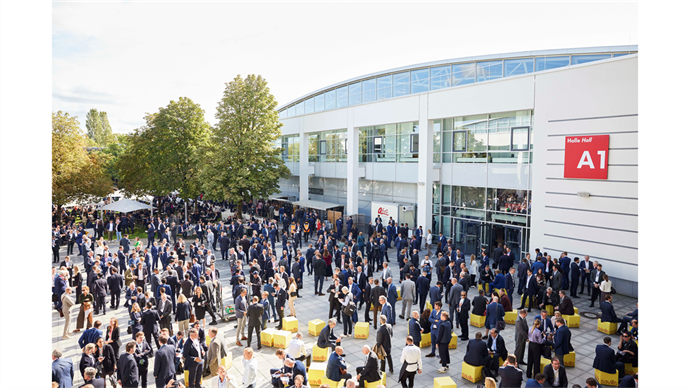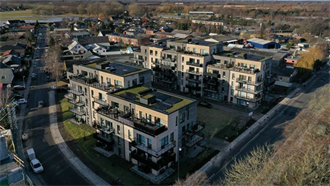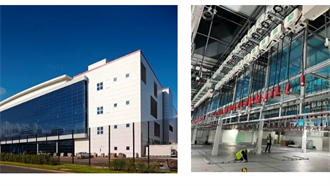Expo Real 2023 wasn't one of the more positive editions of the trade show, but the real estate community gathered in Munich was optimistic about an upturn in the market from 2025.
‘I’ll tell you what isn’t sustainable,’ said one German asset manager, on the promise of anonymity. ‘ESG.’
Expo Real 2023 found the real estate community in sombre mood at times. While debate on driving sustainable transition dominated the conference programme, with participants promising to toe the EU line, voices off-stage sometimes shared mutinous views. With interest rates seemingly set to stay higher for longer, and margins looking wafer thin, several attendees suggested something might have to give.
Said another delegate: ‘In segments such as residential, if we brought the assets up to levels of sustainability required by legislation, rents would become unaffordable. That means environmental goals essentially clashing with social targets.’
Yet even when offered the chance to speak frankly, many participants affirmed that there was no going back. Karim Rochdi, founder and managing partner of German investment manager Aventos, said: ‘ESG is the most important aspect of real estate today. In the current market environment, we can only make a deal if all the risks are addressed. You need a perfect product.’
He added: ‘I know some deals are happening where investors don’t pay close attention to it. But that’s not a long-term plan or strategy.’
Michael Windoffer, head of commercial real estate international clients at Hamburg Commercial Bank, said that lending today was contingent ‘on assets ticking all the ESG boxes’.
Nuno Brito e Cunha, lease ESG advisor Europe in Measurabl’s professional services team, shared similar views, from the standpoint of a tech provider facilitating access to ESG data.
‘ESG data is no longer a “nice to have”, but a leading performance indicator. With stricter EU and US ESG regulations swinging into force next year, the built environment must prove its commitment to sustainability. Those who actively engage in the reporting of accurate ESG data will stand out to investors in a sea of greenwashing,’ he said.
Brito e Cunha added that Measurabl had noticed businesses were increasingly pursuing top Global Real Estate Sustainability Benchmark (GRESB) ratings, a practice which ‘not only prepares commercial real estate entities for increasingly rigorous ESG regulations but also provides a valuable opportunity to benchmark performance against others within the industry’.
He said: ‘Carbon output and electricity consumption, water use, and waste diversion are just a few examples of the factors that impact ESG ratings and reports. Once this data has been compiled, it must be accessible and formatted in compliance with the relevant parties.’
German woes
Another point of discussion which attracted rather varied viewpoints was the outlook for, and health of, Germany’s real estate markets. While the country, if personified, would probably have said that reports of its demise were strongly exaggerated, a new report released by ING Bank on the eve of Expo set the tone for debate.
The ING Bank research noted that while the German economy easily led the European pack more than 10 years ago, growth has since diminished. In fact, while GDP growth in the EU (excluding Germany) was 1.7% on average per year between 2016 and 2022, it only reached 1.1% annually in Germany over the same period. Relying on a model of ‘importing cheap energy and exporting goods’ had left fixed capital investment at historically low levels. Crumbling infrastructure – including woefully slow internet – added to a picture of a country struggling to evolve.
Commented Rochdi on the topic: ‘I think the German real estate industry is not so quick at adapting to new situations. So, when it faces a crisis, it doesn’t have the degree of flexibility you might see in the UK or the US.’
Other interviewees had similar views on the theme. ‘The German market has challenges. Those challenges need to be tackled,’ said Axel Vespermann, head of real estate at Universal Investment.‘ The German real estate market has suffered because those challenges have been recognised but not solved, so interest has waned in German real estate. Bu then again, German property has been extremely favoured by international capital for a long time, and I wouldn’t want to suggest that’s over.’
However, Vespermann revealed that that latest Universal Investment survey of German institutional investors had found that German institutions want to more than double portfolio allocation to North America and Asia in the coming years, and are prepared to reduce allocations to the German market by 12 percentage points to 57%.
Added Mark Holz, head of research at Frankfurt-based asset manager and broker Dr. Lübke & Kelber, specialists in German real estate: ‘Germany is the lame duck in the European panorama. It’s not the economic powerhouse it was post GFC. That said, if you are looking at the labour market, for example, that is in very good shape. Wages are going up and the outlook is rosy. Clearly, Germany will not see economic boom times again as it did 10 years ago, there has perhaps been too little investment into modern businesses. But robust SMEs are still the backbone of the economy.’
‘Stay alive til ‘25’
On balance, the event wasn’t one of the more positive editions of Expo Real. The general mood was often more ‘survive’ than ‘thrive’. Calls of ‘stay alive til ‘25’ were repeated on stands, amid a consensus that ‘this crisis isn’t going to end next year’.
Yet despite European real estate clearly still navigating challenging times, there was a general recognition of the usefulness of getting together at Expo to exchange views.
Said Will Young, vice president, EMEA & corporate development at proptech firm NavigatorCRE: ‘Expo Real always provides an unrivalled opportunity to assess market sentiment across Europe’s commercial real estate market.
‘It’s the conversations in the halls, the deals being inked, the debate on the stages. Whilst everyone here agrees that 2023 has been tough for the commercial property sector, there’s certainly some hope for 2024.’
Young also shared a hope that firms would continue to take advantage of tech solutions in this environment: ‘Inflation is starting to dampen and central bank rates are beginning to stabilise. So there's hope of an uptick in fortunes for commercial real estate the coming year, even for the office market, as increasing numbers of corporations mandate a return to the office.
‘The key, as ever, will be the speed at which investors can spot change and take advantage of the opportunities that arise from it. We seem to hear it more loudly with each passing year at Expo but access to live, comprehensive data that helps firms navigate the shifting sands will be vital.’



































